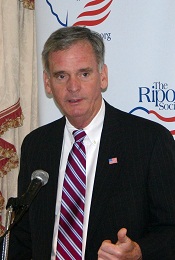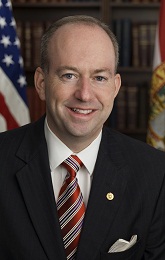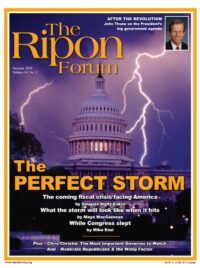Six Republican Senators are leaving office at the end of the year. Below, the Forum features words of wisdom from four of them – advice that is aimed not just at the future of the GOP, but the country as well
 BOB BENNETT
BOB BENNETT
“As I look out at the political landscape now, I find plenty of slogans on the Republican side, but not very many ideas.”
The concern I have is that ideology and a demand for absolute party purity endangers our ability to govern once we get into office. A personal story – back in 1976, a dear friend of mine called and said, “Will you interview for a political position in the Reagan campaign?”
I was not a fan of Governor Reagan – I thought he was too far to the right and he was an ideologue and all the rest of these things. And I didn’t really have any interest in working in the Reagan campaign in 1976. But out of courtesy to this friend, I agreed to do that.
So I went to the interview, and it became very clear as the interview went forward that it was going very well and I was going to be offered a job. And I thought, “I better nip this in the bud right away.” So I said, “Wait a minute, before we go any further, there’s one thing I have to make clear – I am not a true believer.” Whereupon Governor Reagan’s campaign manager said, “That’s alright – neither is the Governor.”
And I came to understand that and have now become a huge Ronald Reagan fan, which as I said, I was not at one point. Because Ronald Reagan, in addition to having slogans that could whip up the ideologues and get them working at the polls, had ideas and solutions to our problems. The reason he was one of the pivotal Presidents of American history was not because of his slogans. It was because of his ideas. I met him but I didn’t know him at all well, but the more I read about him the more I have come to appreciate just how deeply he was immersed in the ideas of government and how surely he understood the issues that we faced. As I look out at the political landscape now, I find plenty of slogans on the Republican side, but not very many ideas.
And indeed, if you raise specific ideas and solutions, as I’ve tried to do on health care with Ron Wyden, you are attacked with the same vigor we’ve seen in American politics all the way back to the arguments over slavery and polygamy. You are attacked as being a wimp, insufficiently pure, and unreliable. And if we cannot get the Republican Party out of that mode, the pendulum will swing. We will take control of the House – and I think that’s going to happen… At which point, it’s “thank you for the slogans” and “thank you for the election.” But in the immortal words of Robert Redford in the movie, The Candidate, “What do we do now?”
If we do not have an answer to that [question], the pendulum will swing away from us as rapidly as it has swung towards us. And we will by default hand the reins of government back to the Democrats.
U.S. Senator Bob Bennett (R-UT) was elected to the Senate in 1992. These remarks are drawn from a speech he delivered to The Ripon Society on June 29, 2010.
KIT BOND
“…it is important to remember there is a lot of real estate between a political opponent and a true enemy.”
 As I’ve traveled across my home State of Missouri, I’ve talked to families who are struggling in today’s economy, I’ve talked to small business owners who are doing their best to stay afloat, and I’ve talked to farmers who are on the brink of losing their family farms. The one thing I have heard time and again is that Washington is not listening.
As I’ve traveled across my home State of Missouri, I’ve talked to families who are struggling in today’s economy, I’ve talked to small business owners who are doing their best to stay afloat, and I’ve talked to farmers who are on the brink of losing their family farms. The one thing I have heard time and again is that Washington is not listening.
Despite the people we serve who say no to “Washington-Gone-Wild” policies, the majority continues to force on the American people big government overreaches – from a financial regulation bill that will change how every American gets credit and is opposed by small business but supported by Goldman Sachs, to proposed cap-and-trade legislation that will impose new gas taxes on every family, farmer and business that big oil companies helped write.
While I’m hearing Americans say they are fed up with Washington’s overspending, overregulation, and over-taxation, some folks are twisting that message to say Americans don’t want bipartisanship. I don’t think that’s true – Americans want Democrats and Republicans to work together on making government work for them. Our party must commit to abandoning the current Washington practice of cramming through partisan solutions with the minority shut out.
Republicans have long believed that government should work for the people and help create the conditions for growth. The root of that philosophy is our belief that this country’s future success – like our past success – depends far more on empowering individual Americans than empowering big government. It is critical that our Party promote policies that reflect this philosophy of empowering individuals over government and work to find common ground with like-minded Democrats.
We can build bipartisan consensus with common sense solutions, including tax relief for individuals, families and small businesses; a comprehensive American energy bill; and real health care reform that lowers costs and improves care.
Building this consensus with pro-growth Democrats is critical to moving our Nation forward. As a Republican Governor, I had to learn to work with a Democratic legislature where I learned our State’s – and our Nation’s – greatest achievements are always bipartisan. In Missouri, by working across the aisle, we created a statewide health care safety net and made early childhood education available to all Missouri children. On the national level, Congress, on a bipartisan basis, passed legislation that put in place an early warning system against terrorist attacks through the Foreign Intelligence Surveillance Act.
It is essential that the Republican Party show the American people that bipartisan, common sense solutions like these are still possible. In a world today where enemies are real–the kind who in their hate-filled rage set off a bomb in a crowded, busy street – it is important to remember there is a lot of real estate between a political opponent and a true enemy.
Showing the American people that Washington – and the Republican Party – is listening does not mean abandoning bipartisanship. Instead, we must do the hard work, roll up our sleeves, and work across the aisle to bring sanity back to Washington policies.
U.S. Senator Kit Bond (R-MO) was elected to the Senate in 1986.
JUDD GREGG
“…we have to have a government that continues to encourage the entrepreneurial spirit of this country which is so great.”
 When we look at what’s happening in Greece, we should be really worried. Because the Greek situation reflects the meltdown of the nation and its economic stability. It’s really a precursor for our situation – whether we like it or not.
When we look at what’s happening in Greece, we should be really worried. Because the Greek situation reflects the meltdown of the nation and its economic stability. It’s really a precursor for our situation – whether we like it or not.
We are going to average over a trillion dollars of deficit for the next 10 years. And our public debt-to-GDP, which was 62 percent this year and has come up from 35 percent just two years ago … will be at 87 percent by 2017. Those are intolerable numbers. Those are numbers which lead to bankruptcy and which lead to insolvency.
What’s driving this? There are two things driving it in my opinion. First is the incredible expansion of government under the Obama Administration. That is a function of the fact that this administration has decided to radically grow the size of government…
We’re [also] going to go from 35 million people retired to 70 million people retired. We’re going to go from the 1950s, where there were 16 people paying into our Social Security retirement program, and now there are two people paying.
How do we address [this problem]?
Well, number one, you stop spending – it’s that simple. You just plain stop spending money you don’t have and adding programs you can’t afford. This is especially true on the discretionary side of the ledger.
Secondly, you’ve got to take on the entitlement programs. You’ve got to look at these entitlement programs – especially Medicare and Social Security – and recognize that because of this demographic shift, they are no longer affordable to the younger generation.
Thirdly, you’ve got to have a better energy policy. You can’t continue to spend $300 billion and send it overseas … to people who don’t like us, buying energy. So we’ve got to have an energy policy which encourages Americans production and encourages conservation…
And, you have to reform the taxes. We have a tax law which essentially is not working. It’s not only not producing revenues that we should be able to produce, it’s also not producing economic activity… We need a tax law that’s simpler and more rational. And it can still be progressive.
Fifth and probably most important, although you can’t get away without doing the first four — those are all important — you have to have a government that understands it is the individual who is the engine of this economy.
We cannot allow ourselves to be moved to a European Democratic welfare state model which is exactly what our colleagues on the other side of the aisle want to do and what this administration has as its goal.
Rather we have to have a government that continues to encourage the entrepreneurial spirit of this country which is so great.
U.S. Senator Judd Gregg (R-NH) was first elected to the Senate in 1992. These remarks are drawn from a speech he delivered to The Ripon Society on July 1, 2010.
GEORGE LEMIEUX
“The greatest threat we have to this country today is our inability to control this out-of-control spending.”
 The No. 1 problem facing this country is our out-of-control spending. It is to a point where it is unsustainable.
The No. 1 problem facing this country is our out-of-control spending. It is to a point where it is unsustainable.
When I was sworn into the Senate in September, this government owed $12 trillion in money it shouldn’t have spent in the past, that it couldn’t afford to spend, and it was carrying that debt. Now, less than a year later, the national debt is $13 trillion. It took 200 years for this country to amass its first trillion dollars in debt, and we just added another trillion dollars in less than a year’s time.
I have worked in both the private and public sectors and in each, we looked at receipts, and only spent – at most – as much money as we took in.
But Washington does not understand the basic dynamic that businesses, most state governments, and families in Florida and around the country have to make ends meet.
Right now, we spend $200 billion a year paying interest on the debt. At our current rate of spending, as projected by the White House, by the end of this decade we will spend $900 billion a year just making interest payments on debt. By 2020, our national debt will top $25 trillion and when we get to that point, our country is going to fail. This is not just a problem for our children or our grandchildren, but for generations still to come.
Perhaps most troubling is the government only takes in enough in tax receipts to cover entitlement programs like Social Security, Medicare, and Medicaid. Every other dollar we spend for every other function of government is borrowed. Washington’s spending is unsustainable.
Does Congress ever ask if government is spending money on things that are effective and efficient? No.
Instead, Washington creates new programs. We pass a financial regulatory reform bill and instead of firing all the people at the SEC who failed to do their job in policing Wall Street, we create a new governmental institution because that is what Washington does — more and more layers of government on top of government, with nobody paying attention to the impact.
Until we can enact a balanced budget amendment requiring the federal government to spend only as much as it takes in, we should cap spending at a level that would allow government to carry out its intended functions, and pay down the national debt.
If we simply capped federal spending at the level we spent in 2007, our budget would be balanced in three years and the debt would be cut in half by 2020. The federal government can survive on $2.729 trillion, and lawmakers have an obligation to move in that direction, immediately.
If we do not address government spending, my greatest fear is the day one of my four children will come to me and say: “Dad, I am moving to a foreign country. I am going to Brazil or India or China because the opportunities in that country are greater than those in the United States.”
The greatest threat we have to this country today is our inability to control this out-of-control spending. If we do not do it, we will violate the American creed, which is that we leave this country a better place than we found it for each generation that follows.
U.S. Senator George LeMieux was appointed to the Senate in 2009.




